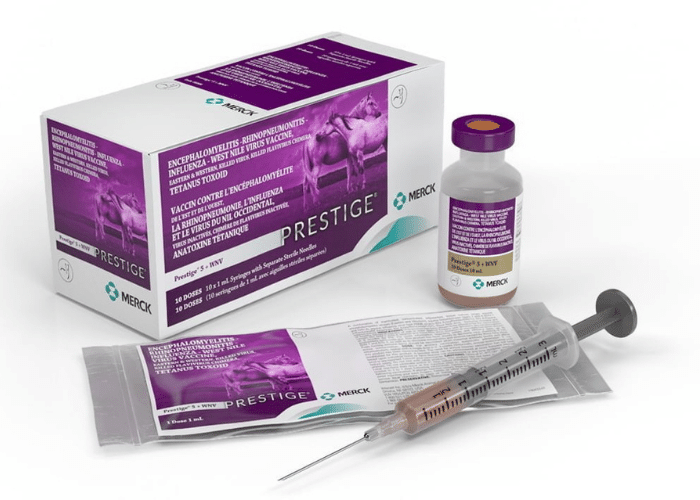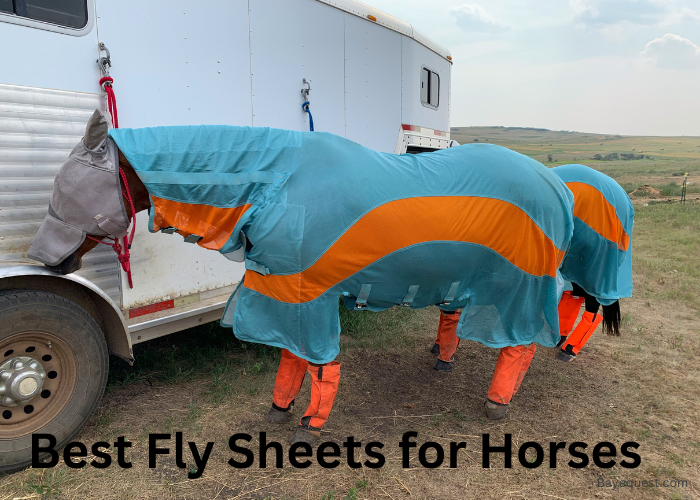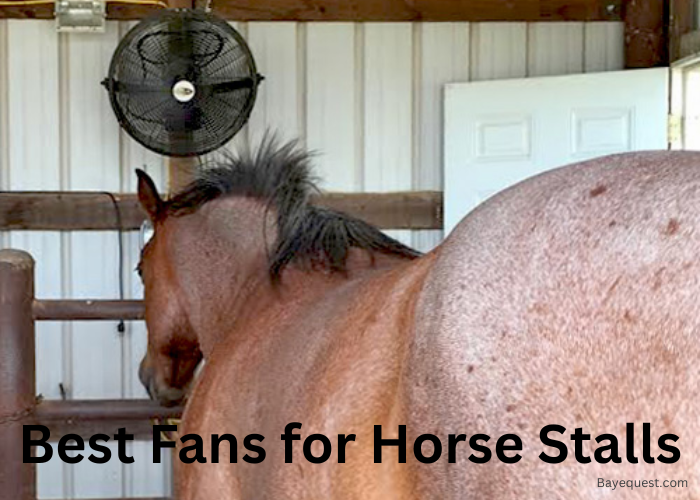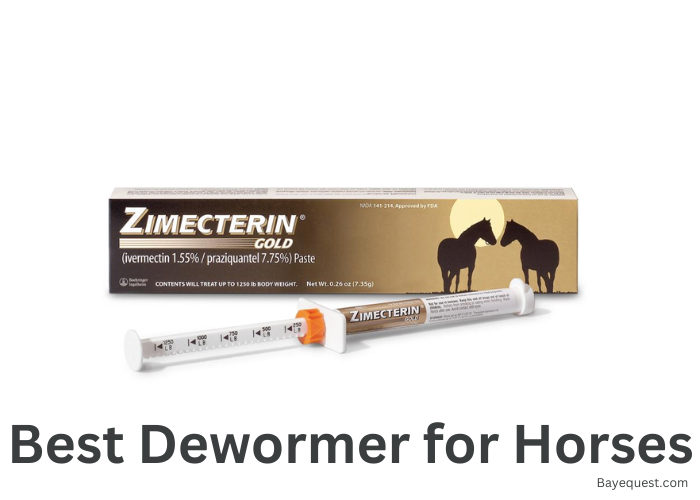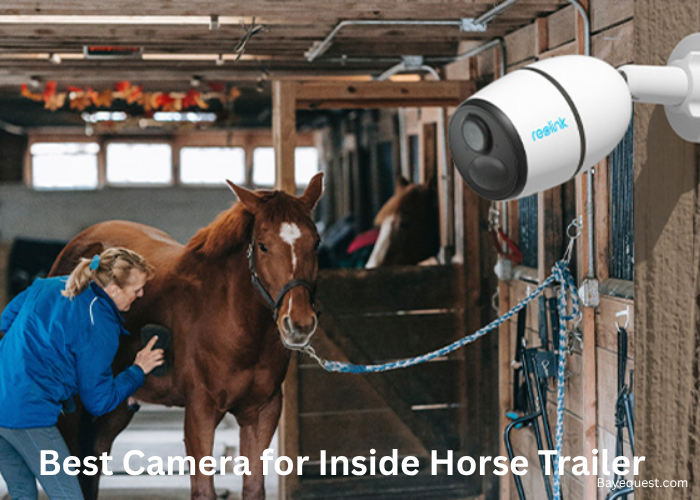Ever heard of the 5 Way Horse Vaccine? If not, you’re in for a treat. Think of it as a superhero serum for your equine friend.
This one-shot guards against five nasty diseases, keeping your horse healthy and happy. It’s like getting five for the price of one – who doesn’t love a good deal?
In this blog, we’ll break down what’s in this magical mix, why it’s essential, and how it keeps your horse galloping strong. Whether you’re a seasoned rider or a newbie to the stable, we’ve got the scoop you need.
So, saddle up, and let’s dive into equine vaccines. Your horse will thank you for it.
What is a Vaccine?
A vaccine is a substance that helps the body develop immunity to a specific disease. It contains weakened or inactive parts of a virus or bacteria called antigens.
When a vaccine is administered, the immune system recognizes these antigens as foreign invaders. It then creates antibodies to fight them off.
This process trains the body to recognize and combat the disease in the future. Vaccines can prevent illness and reduce the spread of infectious diseases.
Common Types of Vaccines
Some common types of vaccines include:
1. Live Attenuated Vaccines
These vaccines use a weakened form of the germ that causes a disease. They are strong enough to create immunity but not to cause illness.
Examples include Measles, mumps, rubella (MMR) vaccine, and chickenpox vaccine.
2. Inactivated Vaccines
These vaccines use a killed version of the germ. They don’t provide immunity as strong as live vaccines, so you may need several doses over time.
They include Polio vaccine and hepatitis A vaccine.
3. Subunit, Recombinant, Polysaccharide, and Conjugate Vaccines
These vaccines use specific pieces of the germ, such as its protein, sugar, or capsid. They give a strong immune response to parts of the germ.
Some of these vaccines are the HPV vaccine, hepatitis B vaccine, and pneumococcal vaccine.
4. Toxoid Vaccines
These vaccines use a toxin made by the germ. They create immunity to the parts of the germ that cause disease, not the germ itself.
Diphtheria and tetanus vaccines.
5. mRNA Vaccines
These vaccines are a new type. They use messenger RNA to instruct cells to produce a protein that triggers an immune response. The COVID-19 vaccines by Pfizer-BioNTech and Moderna fall into this category.
6. Viral Vector Vaccines
These vaccines use a modified version of a different virus as a vector to deliver genetic material from the germ. This material teaches cells to make a protein that triggers an immune response.
Some of the viral vector vaccines are the Ebola vaccine and some COVID-19 vaccines like Johnson & Johnson’s.
What is the 5 Way Horse Vaccine?
The 5 Way Horse Vaccine is a combination vaccine given to horses. It’s called “5 Way” because it protects against five threats with just one shot.
This makes it easier and more convenient for horse owners to keep their animals healthy. Instead of multiple injections, one dose saves time and reduces stress for both the horse and the owner.
It’s an efficient way to ensure your horse gets the protection it needs, all in one go. Here’s what it includes:
Eastern Equine Encephalomyelitis (EEE). A virus causing severe brain inflammation, spread by mosquitoes.
Western Equine Encephalomyelitis (WEE). Another mosquito-borne virus affecting the brain.
Tetanus. A bacterial infection from soil that enters through wounds and impacts the nervous system.
Equine Influenza. A highly contagious respiratory virus similar to the human flu.
Rhinopneumonitis (Equine Herpesvirus 1 and 4). Viruses causing respiratory illness and sometimes reproductive issues.
Are 5 Way Vaccines Safe for My Horses?
Yes, 5 Way Vaccines are safe for your horses. These vaccines are tested and approved by vets. They help protect your horse from serious diseases. Most horses do fine with them.
Sometimes, a horse might have a mild reaction. You might see some swelling at the injection site or some soreness. This is normal and goes away quickly. Serious reactions are rare.
Using a 5 Way Vaccine is a smart choice. It reduces the number of shots your horse needs. This means less stress for your horse and more peace of mind for you.
Always talk to your vet if you have concerns. They can guide you and make sure your horse stays healthy.
Components of the 5 Way Horse Vaccine
The 5 Way Horse Vaccine includes five key components. These parts work together to protect your horse from serious diseases. Here’s a quick look at what’s inside:
1. Eastern encephalomyelitis component. This part protects against a brain infection spread by mosquitoes.
2. Western encephalomyelitis component. Similar to the Eastern component, it guards against another type of brain infection from mosquitoes.
3. Tetanus toxoid. This part protects against tetanus, a bacterial infection from soil that affects the nervous system.
4. Influenza component. This part helps prevent equine flu, a highly contagious respiratory disease.
5. Rhinopneumonitis component. This part covers two types of equine herpesvirus that cause respiratory illness and other issues.
Each component targets a different threat, making the 5 Way Vaccine a comprehensive solution.
Benefits of the 5 Way Horse Vaccine
I would recommend the 5 way vaccine because it is:
Comprehensive. It guards against five major diseases with a single shot, ensuring your horse is well-protected.
Convenient. Instead of scheduling multiple vaccinations, you can manage everything in one go, saving time and reducing hassle.
Less stressful for horses. Fewer injections mean less discomfort and stress for your horse.
Cost-effective. Combining multiple vaccines into one can be more economical than buying and administering separate vaccines.
Improved health management. With fewer vaccines to track, it’s easier to maintain a consistent and reliable health schedule for your horse.
Trusted by veterinarians. Vets widely recommend it because it provides broad protection and is backed by extensive research and testing.
Administration Guidelines
Giving your horse the 5 Way Vaccine is important in keeping them healthy. It’s crucial to do it right to ensure maximum protection.
Here’s how you can administer the vaccine properly:
1. Give the vaccine at the right time. Foals usually get their first dose at 4 to 6 months old. Adult horses need boosters at least once a year.
2. Follow the dosage instructions on the package. It’s usually one shot per horse but check with your vet.
3. Store the vaccine in a cool, dry place. Keep it refrigerated, but don’t freeze it. Before giving the shot, let the vaccine come to room temperature.
4. Administer the vaccine in the neck or hindquarters. Clean the injection site with alcohol to avoid infection.
5. Use a clean, sterile needle. Insert the needle at a 90-degree angle to the skin. Inject the vaccine slowly and steadily.
6. Watch your horse for any reactions after the shot. Some swelling or soreness is normal. Call your vet immediately if your horse seems uncomfortable or has a severe reaction.
Potential Risks and Side Effects
While the 5 Way Vaccine is generally safe, knowing about potential risks and side effects is good. Here’s what to watch for:
Mild reactions. Your horse might have some swelling at the injection site. This is normal and should go away in a day or two. They might also feel a bit sore or tired.
Fever. Sometimes, horses can run a slight fever after getting vaccinated. This usually isn’t serious and will pass quickly.
Allergic reactions. In rare cases, horses might have an allergic reaction. Signs include hives, itching, or difficulty breathing. If you see these, call your vet immediately.
Injection site abscess. Occasionally, an abscess, a lump filled with pus, might form at the injection site. Your vet will need to treat it if this happens.
Behavior changes. Your horse might seem off for a day or two. They might be less energetic or have a reduced appetite. This is usually temporary.
Serious reactions. Very rarely, a horse might have a severe reaction like anaphylaxis. This is a medical emergency. Symptoms include sudden collapse, difficulty breathing, and extreme swelling.
Will My Horse Need a Booster Shot?
Yes, your horse will need a booster shot. Here’s why and how often:
Foals, or young horses, get their first dose of the 5 Way Vaccine at about 4 to 6 months old. This first shot starts to build their immunity, but it’s not quite enough.
That’s why foals usually need a booster 3 to 4 weeks after their initial shot. This second dose strengthens their immune response, giving them the best protection as they grow.
For adult horses, booster shots are needed annually. Each year, a booster shot helps maintain the immunity built up from previous vaccinations.
This yearly shot ensures that your horse’s protection against these five diseases remains strong and effective. Without these regular boosters, the immunity can weaken, leaving your horse more vulnerable to illness.
Some horses might need more frequent boosters, especially if they are considered high-risk. High-risk horses travel frequently, attend shows, or come into contact with many other horses.
These situations can expose them to more germs, so additional boosters might be necessary. Your vet can give you specific advice tailored to your horse’s lifestyle and health needs.
Why Do 5 Way Vaccines Have the +WNV on the Label?
The “5 Way Vaccine +WNV” label means that the vaccine also protects against West Nile Virus (WNV) and the five core diseases. WNV is a serious illness transmitted by mosquitoes that can cause neurological problems in horses.
Here’s why this addition is important:
Extra protection. Adding WNV to the 5 Way Vaccine provides comprehensive protection in one shot. It means fewer injections for your horse and broader immunity coverage.
Convenience. With the +WNV option, you don’t need to administer a separate vaccine for West Nile Virus. This saves time and reduces the stress on your horse from multiple injections.
Increased safety. West Nile Virus can be very dangerous, leading to severe symptoms and even death in horses. By including WNV in the vaccine, you ensure your horse is protected against this potentially deadly virus.
What Types of 5 Way Vaccines Are There?
There are different types of 5 Way Vaccines available for horses. Each type is designed to meet specific needs and preferences. Here are the main types:
Standard 5 way vaccine
This is the basic version that protects against five core diseases. It’s suitable for most horses and provides essential coverage.
It is ideal for regular, healthy horses with no special risk factors.
5 way vaccine +WNV (West Nile Virus)
This version includes protection against West Nile Virus in addition to the five core diseases. It’s labeled as “5 Way +WNV.”
It’s great for horses in areas where West Nile Virus is a concern or for owners who prefer comprehensive coverage in one shot.
Modified live vaccine (MLV)
This vaccine contains live but weakened forms of the viruses. It stimulates a strong immune response.
It’s often used in younger, healthy horses to build robust immunity.
Killed vaccine
Contains inactivated viruses that can’t cause disease. It’s safer for horses with weakened immune systems or those in poor health.
It suits pregnant mares, older horses, or those with health issues.
Adjuvanted vaccine
Includes substances (adjuvants) that boost the immune response. It enhances the effectiveness of the vaccine.
This vaccine is useful for horses that need a stronger immune response or are at higher risk.
What Other Vaccines Do Horses Get?
Other vaccines that horses need include:
Rabies vaccine. Protects against rabies, a fatal viral disease that affects the nervous system.
Potomac horse fever vaccine. Guards against Potomac Horse Fever, a bacterial infection that causes fever, diarrhea, and laminitis.
Strangles vaccine. Prevents strangles, a highly contagious bacterial infection causing abscesses in the lymph nodes.
Botulism vaccine. Protects against botulism, a serious illness caused by toxins produced by Clostridium botulinum.
Equine viral arteritis (EVA) vaccine. Prevents EVA, a viral disease causing fever, respiratory issues, and reproductive problems.
Anthrax vaccine. Used in areas where anthrax is a known risk. Protects against this bacterial disease, which can be fatal.
Equine herpesvirus (EHV) vaccine. Protects against Equine Herpesvirus (EHV-1 and EHV-4), which causes respiratory illness, reproductive issues, and neurological disease.
Rotavirus vaccine. Given to pregnant mares to protect foals against rotavirus, which causes severe diarrhea in young horses.
Leptospirosis vaccine. This vaccine protects against leptospirosis, a bacterial infection that can cause eye, kidney, and reproductive issues.
How to Choose the Right Vaccine for Your Horse
Choosing the right vaccine for your horse involves several important steps. Here’s how to make the best decision:
Consult your veterinarian
Your vet knows your horse’s health history and can recommend the best vaccines based on age, lifestyle, and health status. Schedule a consultation to discuss your horse’s vaccination needs.
Assess your horse’s environment.
Horses in different environments face different risks. For example, those in mosquito-prone areas might need protection against West Nile Virus.
Consider your horse’s age and health.
Different horses have different vaccination needs. Tailor the vaccination plan to your horse’s specific stage of life and overall health condition.
Understand the types of vaccines.
There are various vaccine types each with its benefits. Learn about the vaccines available and discuss with your vet which is most suitable for your horse.
Follow recommended schedules.
Timely vaccinations and boosters are crucial for maintaining immunity. Stick to the vaccination schedule recommended by your vet.
Monitor for reactions.
Some horses may have mild reactions to vaccines and, in rare cases, more severe reactions. Observe your horse after vaccination and immediately report any unusual signs to your vet.
Stay updated on new vaccines.
Advances in veterinary medicine can lead to new and improved vaccines. Keep in touch with your vet about any new vaccines or changes in vaccination recommendations.
Interesting read: Is Ketamine a Horse Tranquilizer?
What to Do If Your Horse Shows Adverse Reactions to the Vaccine
If your horse shows adverse reactions to the vaccine, you need to act quickly and calmly. Here’s what to do:
1. Monitor your horse. Keep a close eye on your horse after vaccination. Look for signs of swelling, soreness, fever, or changes in behavior.
2. Contact your veterinarian. If you notice anything unusual, call your vet right away. Describe the symptoms and ask for advice on what to do next.
3. Provide comfort. Make your horse comfortable. If there is swelling at the injection site, you can apply a cold compress to reduce it.
4. Follow vet instructions. Your vet might suggest specific treatments, like anti-inflammatory medications or additional monitoring. Follow their advice closely.
5. Keep records. Document any reactions your horse has. Note the date, type of vaccine, and the symptoms observed. This information will be helpful for future vaccinations.
6. Prepare for future vaccinations. Discuss with your vet about any necessary precautions for future vaccinations. They may recommend a different type of vaccine or pre-treatment to prevent reactions.
Conclusion
Wrapping up, the 5 Way Horse Vaccine is like hitting the jackpot for horse health. One shot, five big protections. It’s a no-brainer for keeping your horse safe and sound.
Remember, check with your vet, stay on schedule, and keep an eye on your horse after the shot. Vaccinations are a key part of a healthy horse’s life. They’re quick, effective, and give you peace of mind.
So, saddle up and get those vaccinations done. Your horse will thank you with every gallop, nuzzle, and whinny. Stay sharp, stay informed, and keep your equine friend in top shape. Happy riding.




